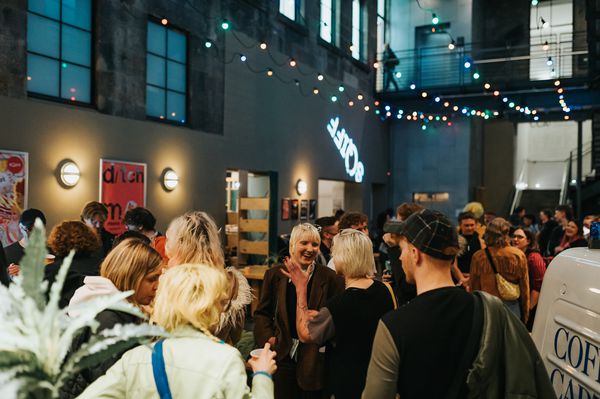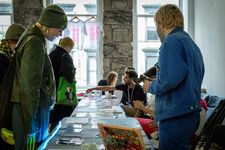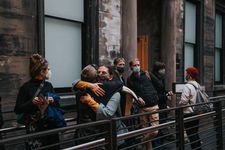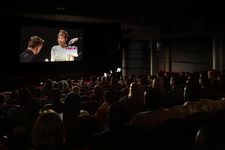 |
| Party time at SQIFF Photo: Tiu Makkonen |
The Scottish Queer International Film Festival (SQIFF) is entering its ninth year this month, with events scheduled to run between the 8th and the 12th at Glasgow’s CCA and GFT. It’s come a long way from its humble beginnings and now brings in a large crowd every year, with a great atmosphere and lots of socialising going on around the films and events themselves. Perhaps most impressively, it has managed to extend its appeal without losing the sense of community and camaraderie which its team is proud to have created.
In the run-up to this year’s event, I caught up with festival director Indigo Korres to ask how she’s feeling about it.
“I'm very excited,” says Indigo, who is beaming so much that she couldn’t hide it if she tried. “The festival is back again for our ninth edition this year. We actually had more time to prepare for things, so I think the programme is looking very polished and I'm very happy about it. And we’ve been able to have some guest programmers to add to it. For me, some of the highlights of the festival are the screening of Lesvia, which is a lesbian film documentary about 15 years of the community there. It’s just beautiful. That's the film that's closing the festival.
 |
| Inside SQIFF Photo: Ocean Teal |
“We’re bringing back the Scottish shorts with the Best Scottish Short award this year. We didn't have it last year. We have over 100 films in the programme and the program is out, so I just hope people will check it out.
“We accept submissions every year, and this year we got over 600, which is quite a lot to go through. But we have two main curators that watch all of the films, and they are the ones that pick and choose, and we have regular programming meetings to see what fits together in terms of films and what they want to highlight in the year. So this year, for example, we have loads of films around queer and trans Black people and people of colour, and we wanted to highlight that. Last year it was mostly trans films that we wanted to highlight. So every year we focus on different themes, and there’s a huge variety of genres for the holiday festival.
“There's definitely a film in the programme for everyone. We always try to have animation screenings, for example, and the focus on the Scottish films, and then other programmes that we can bring in sometimes. In 2021 we did a program called Queer Asia, and they wanted to bring that back this year, so we went through some of the films on Film Freeway and the programme together. And then in terms of partnership events with other film festivals this year, we're partnering with Take One Action and Edinburgh Deaf Festival to bring a variety of shorts around Deaf and hard of hearing culture. And another partnership that we are bringing this year is with Oscar Bright, who focus on people with various disabilities. So those films, we didn't get them through the submissions - we curated those strands. It's a variety of collaborative ways that we bring together the programme.”
One of the things that SQIFF has always excelled at is accessibility – for people right across the LGBTQ+ community, for disabled people and also for people who might find it financially difficult to engage with film as much as they’d like to.
“SQIFF started focused on accessibility,” Indigo explains. “The founders, from the first year, decided that we were going to have descriptive subtitles for all the films. They put the sliding scale together for ticket prices, which SQIFF was a pioneer of in Scotland, and many festivals are following up on that. People pay as much as they can to be able to attend the festival. And over the years, we've been building on our access measures. I think accessibility is something that we're always developing. There are various people with disabilities that contradict each other sometimes, as well, so we have to find ways to make them successful as much as we can.
 |
| Socialising at SQIFF Photo: Ocean Teal |
“This year we have descriptive subtitles in all of our programmes, and all of our films have live captioning as well. We have audio description for some of the events for blind and visually impaired people, and also we have BSL interpretation on all the events. We have a team of access support workers throughout the festival to help people out. We always make sure the venues are accessible as well. In our brochure we have included all access and content notes for each individual film, so if someone wants to come to a shorts programme and watch just a couple of films, and then there's a film that they don't want to watch, because the content post, they know what order the films are and they can leave for that and come back if that's what they want.”
Over the past few years, SQIFF has matured and found its place in the festival calendar in Scotland. How might we expect it to change in the future?
“We've been growing a lot in the past few years, and in 2019 we had so many events around Glasgow that it was hard for the core team, because it's quite a lot of work to put on. So we decided to scale down a little bit to make sure that everyone working on the festival was also focusing on their active needs. And now I think we're in a scale that works quite well for the team and for our audiences. We have 24 events throughout five days.
“This year we just became a charity, so we're hoping that we'll be able to access more core funding to allow us to do more year round work. Last year we started our Queer Filmmakers group, which is a monthly group that meets at the CCA. Basically, we just want to promote the work of Scottish queer filmmakers. Other events that we've done year round have been tours and filmmaking workshops with various people, but we do want to create a more sustainable year round structure instead of just a lot of events in one week and then going away for a year. So we will always be here for filmmakers and for audiences.”
Everybody I’ve ever spoken to on the SQIFF team has been passionate about it, and Indigo is no exception.
 |
| Onscreen at SQIFF Photo: Ocean Teal |
“For me, it's a community space. I got involved when I was at uni and there was an event in 2019 that I got involved in as a videographer. I just filmed some events around Glasgow, and then in 2020, when the festival was online because of the pandemic, I was working in the access team, and then in 2021, I became the program coordinator. So I kind of did a little bit of everything in the festival, and now I've been running it for the past couple of years.
“I just love how the festival is very accessible towards the staff and not only the audiences. Half of our team is trans and disabled, and we always care for each other. Personally, coming from Brazil, I just feel really safe and loved in this festival, so I just want to continue working with it and I hope we can keep going and do more of them.
“We have so many events, and I hope people can come and enjoy and make their own community. And also, I just wanted to say that we are very approachable, so if anyone wants to talk to anyone during the festival, please do. We're running around, but we are always open for a chat!”





















